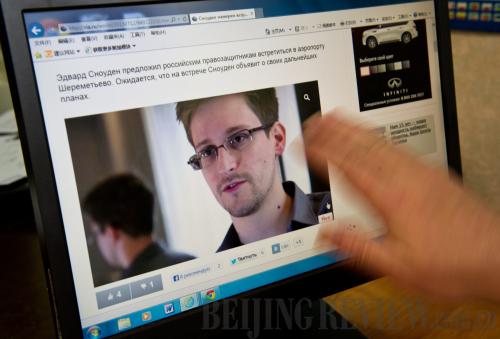The Snowden factor
- By An Gang
 0 Comment(s)
0 Comment(s) Print
Print E-mail Beijing Review, July 31, 2013
E-mail Beijing Review, July 31, 2013
When Chinese President Xi Jinping and his U.S. counterpart Barack Obama carried out a historic meeting in California in June, neither was prepared for the monumental leaks that former U.S. National Security Agency (NSA) contractor Edward Snowden released to the media.
|
|
|
A Russian journalist opens a website reporting on U.S. whistleblower Edward Snowden in Moscow on July 12. [By Jiang Kehong/Xinhua] |
Snowden arrived secretly in Hong Kong in late May with inside knowledge of the massive NSA surveillance program codenamed PRISM. The documents he leaked showed that the U.S. Government has been collecting U.S. citizens' e-mails, instant messages, videos, photos, data storage, voice chats and social network data during the past six years. Furthermore, U.S. intelligence departments have spied on dozens of countries' diplomatic missions to the United States and the UN, including its allies like Japan, the EU, Mexico, South Korea and India.
The whistleblower also told Hong Kong-based South China Morning Post that the U.S. Government has launched Internet attacks against Chinese institutions and individuals for years. He specified that the NSA had hacked into Chinese telecommunication companies to obtain mobile phone information. It also constantly attacked Tsinghua University's backbone network and telecommunication company Pacnet's computers in its Hong Kong headquarters, as the company possesses one of the largest undersea fiber optic cable networks in the region.
On June 14, U.S. federal law enforcement formally charged Snowden with espionage, pilferage and transfer of government property. The United States then requested Hong Kong Special Administration Region (SAR) Government to hold Snowden in custody with a provisional arrest warrant.
Public outcry
The Snowden event triggered a public outcry in China. Public opinion overwhelmingly believed the United States has a "double standard on cyber security," and "owes the world an explanation." Claims resounded that cyber security is another excuse used by Washington to strategically contain China. In one online survey, about 40 percent of respondents supported Snowden's act, while 17 percent expressed objection. A Global Times poll showed over 70 percent of respondents hoped Snowden would "expose the U.S. Government's double standard on cyber space," and held no brief for extraditing Snowden back to the United States. According to South China Morning Post, over half of Hong Kong citizens objected to repatriating Snowden, with only 17 percent in support.
Some Chinese media and critics believed the Snowden event will be a turning point in the moral positions of China and the United States in terms of cyber security. Global Times published 10 editorials from June 3 to July 11, calling on Hong Kong to refuse to repatriate Snowden. The newspaper pointed out that the United States had been playing the victim of cyber attacks before the Snowden event took place, and now Washington has proved to be the organizer and enforcer of the worst cyber espionage in history.
During the three years before the NSA leaks, China had been under high pressure from the U.S. Government and military, with cyber freedom and security rapidly becoming a focus of China-U.S. relations. While accusing Beijing of restraining Internet freedom, Washington expressed concerns on "organized Chinese hackers stealing business and military secrets from the United States." It even forced China to clarify whether or not it had a "cyber army." Chinese critics asserted that Washington aims to expand its hegemony to cyber space and secure an advantageous position.
Compared with the media hype, the Chinese Government has maintained a restrained and low-key attitude toward the scandal, apparently trying to avoid any impact on China-U.S. relations stemming from the Hong Kong SAR Government's settlement.
The Chinese Ministry of Foreign Affairs iterated that China is a victim of cyber attacks, and it is willing to cooperate with the international community to protect the security of cyber space. Instead of directly commenting on Washington's request to Hong Kong SAR on temporarily arresting Snowden, the Chinese side expressed the intention of "respecting Hong Kong SAR's decision according to law." Responding to former U.S. Vice President Dick Cheney's accusation that Snowden was possibly a Chinese spy, China officially dismissed the assertion as being "completely ridiculous."







Go to Forum >>0 Comment(s)